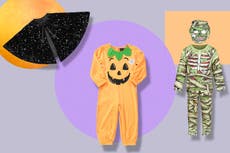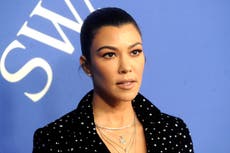The Independent's journalism is supported by our readers. When you purchase through links on our site, we may earn commission.
Tired spirit and unfulfilled expectation: Why Halloween has an age cap
If the purpose of celebrating Halloween is no longer about dressing up as someone new or indulging in sugary delights, then willingness to take part in 31 October festivities will soon be lost, Kaleigh Werner writes


My earliest memory of Halloween was the year I dressed as Joe Jonas. The year was 2008 – Jonas’s Camp Rock era. Even with his noticeably flat-ironed black hair, I still squealed every time he kicked back his microphone stand to sing “Play My Music” in the Disney Channel film. I couldn’t tell you why I decided to dress as the brooding rocker that year, but it was the first time I remember feeling creative. Although my tucked in white T-shirt and skinny jeans combo wasn’t exactly revolutionary, assuming the teen heartthrob for a night felt particularly original.
Of course, as an eight-year-old child old enough to develop class consciousness, I begged my mother to take me to the street with three-story homes and king-sized candy bars. I remember the thrill pulsing through me as I stood in front of “my brothers” – and by brothers, I mean my two friends dressed as Kevin and Nick Jonas – to knock on the towering doors.
By the end of the night, counting the amount of Milky Ways, Snickers, Reeses and (if there were no better options) mini-Hershey’s bars, left me with an air of irreplaceable triumph and satisfaction. The sad part - and what I didn’t know at the time - once the trick-or-treating stopped, my perception of the holiday would change.
Sometime between prolonged candy expeditions to dressing up for back-to-back “Halloweekend” parties, my spooky season spirit began to tire. Candy-filled pillowcases soon became liquor-infused cocktails, and I found the buzz to be far less appealing. This year, what little Halloween morale I might’ve had left now feels as though it’s fizzled out – and I know I’m not the only one.
The advertised terror and creative pressures of the commercialised holiday can get to be too much as you get older. Sipping orange-coloured martinis just doesn’t feel the same compared to the candy-filled excitement of Halloween’s past, and it never amounts to the expectation.
Call me a pessimist, and maybe I am, but there’s something to be said about the diminishing interest in Halloween after the innocence of trick-or-treating is lost. The costumes - whether they’re well thought-out or affordably assembled - are less important when the only people who actually see them are those standing in line at bar that isn’t worth the wait - or the entry fee. If the purpose of Halloween is no longer dressing up as someone new, indulging in sugary delights, or taking pleasure in being the most animated version of yourself, then willingness to take part in the 31 October festivities will soon be lost.
There are a few factors that contribute to the inevitable absence of Halloween enthusiasm, the first being the inability to trick-or-treat past a certain age. The promise of sweet treats is every child’s first introduction to Halloween. When you’re young, you’re expected to fill a bag or bowl with an amount of candy that could put you in a sugar coma.
Unfortunately, this can only go on for so long. Most places have laws making it illegal for individuals to trick-or-treat over a certain age. According to a 9News report, the town of Chesapeake, Virginia, prohibits anyone over the age of 14 of trick-or-treating on Halloween. If they’re caught doing so, they could potentially be charged with a Class 4 misdemeanor. In Virgina Beach, Portsmouth, Suffolk, and Norfolk, the age limit to trick-or-treat is 12 and under. Meanwhile, South Carolina prohibits anyone over the age of 16 from not only trick-or-treating but wearing a spooky mask in public.
By law, individuals past a certain age are deemed “too old” to trick-or-treat, but one study proves people have a different perspective. Per a 2021 YouGov report, more than a quarter of adults believe no child is too old to partake in the Halloween tradition. What’s more, a 2019 survey by Today indicated that 46 per cent of parents agree with the sentiment.
Whether you think individuals, no matter their age, should be allowed to trick-or-treat or not, we always somehow end up abiding by the state statutes. Maybe your friends think they’re “too old” or “too cool” to politely ask their neighbours for candy. Maybe you decided collecting all that sugar wasn’t worth it, if more than half of it would end up thrown away. Regardless, there comes a point in adolescence when something forces you to leave behind this sacred part of Halloween that’s most likely the reason you fell in love with the holiday.
Some could make the argument that this childhood loss is typical, and a part of growing up is learning to accept that your interests change as you mature. Fine. However, with maturity comes a newfound understanding of monetary necessity.
Halloween is a cash vaccuum. According to the National Retail Federation’s 2023 Prosper Insights & Analytics survey, the Halloween spending expectation for this year is set at $12.2bn, $1.6bn more than the reported amount in 2022. Capital One estimated $3.6bn of that total is spent on candy. Between candy, costumes, greeting cards, and decorations, the average amount an invidual will spend is $100, and that doesn’t include plans for the night of 31 October.
Furthermore, only 40 per cent of Halloween customers shop at discount stores, meaning the remaining 60 per cent are making their purchases online, at speciality stores, markets, and department stores. About 12 per cent of Halloween shoppers go to thrift or consignment shops, per Capital One’s report.
The holiday practically begs you to spend money – on a costume, decorations, candy, drinks, tickets, etc. When you’re no longer spending the night roaming around the streets, picking up freebie treats, you’re forced to arrange other plans. Children’s costumes no longer fit you, so you come up with more elaborate ideas and spend money ordering props ahead of time. From fake blood to long wigs, a race car driver suit, and a set of handcuffs, often when your costume creativity expands, your expenses do too.
The frustrating part is that there’s this unspoken burden of having to come up with something new each year, and if you’re in college or out of school, it’s very possible there’ll be multiple nights of festivities - meaning an expectation to come up with two to four costume ideas. Let’s say you’re a ballerina one year and then you decide to be a vampire the next, what do you do with the tutu and tiara you spent around $20 on last Halloween? After some time, Halloween spins a web of wasted props. If you’re savvy, you can potentially come up with a few ideas to reuse your leftovers. But there’s only so much you can do with a baton and magician’s hat.
One experienced night life worker added insight into why clubs and bars, specifically in New York City, raise their entry fees for the occasion.
“So on these popular weekends, like Halloween, New Year’s Eve, venues view it as an opportunity to cash in on a time where people are willing to spend money for an experience,” Ariana Nathani, host of the Drinks First podcast, said. “Entry alone, you’re looking at anywhere between $80 to $100.”
The most upsetting factor that damages your Halloween spirit is the unavoidable destruction of costume artistry. Once the purpose shifts from candy collection to partying, you unconsciously stray from dressing for yourself. The urge to piece together a look that attracts the male or female gaze, or is inherently trendy, often becomes a driving force in deciding on the character you want to assume. For many revellers, the inclination to be the Regina George or Aaron Samuels at the party trumps the desire to throw on a look that screams Halloween, like Cady Heron in Mean Girls.
Conversations online have also erupted over how Halloween seemingly caters to a certain size demographic, with costume shops only offering a small size range. Style mogul and influencer Remi Bader’s known for her “realistic” costume hauls, in which she orders plus-size options online and exposes how they really fit – a number of which don’t.
Statistics derived from the Yahoo/YouGov poll of US adults this year supports the hypothesis that Halloween really does have an age cap – people over a certain age aren’t motivated to participate. The survey reported that only 22 per cent of adults in the US are dressing up for the holiday this year, 63 per cent aren’t dressing up, and 14 per cent haven’t decided if they’re going to or not.
Famed fashion TikToker Kate Bartlett has also shared her true feelings about how the high expectations of Halloween have led her to hate the holiday. The 22 year old questioned when the spooky night turned into a multi-day bash with festivities taking place long before the actual night.
“What I want to know is when did Halloween turn into a week-long thing. It used to just be one night. I will preface this rant by saying I am a very social person,” the influencer confessed. “I am not a hater of many things, I’m really not. But I am a hater of Halloween.”
All this being said, how do we hold on to the innocence of Halloween, so we don’t end up metaphorically ageing out?
Expectations are often born from societal norms. Just because others your age are willing to shimmy themselves between hundreds of people inside an overpriced club while holding cumbersome accessories doesn’t mean that’s the only way to celebrate Halloween in your 20s, 30s, 40s and so on. When some of the only traditions associated with the holiday becomes unapplicable, it’s time to make new ones.
You can dress up like your favourite actor or object, don a get-up that’s reminiscent of a book you love, or you can take the opportunity to wear an outfit you’ve always wanted to. You could also not dress up and just stay in. The beautiful part of Halloween is there are no rules. Halloween is a night to make the imaginary a reality, and it’s okay if that looks different for you than it does for everyone else.
If you’re really at a loss for how to steer clear of the crowded spots filled with people dressed as the same stale characters, here’s what you can do on Halloween instead.
Join our commenting forum
Join thought-provoking conversations, follow other Independent readers and see their replies
Comments


Bookmark popover
Removed from bookmarks